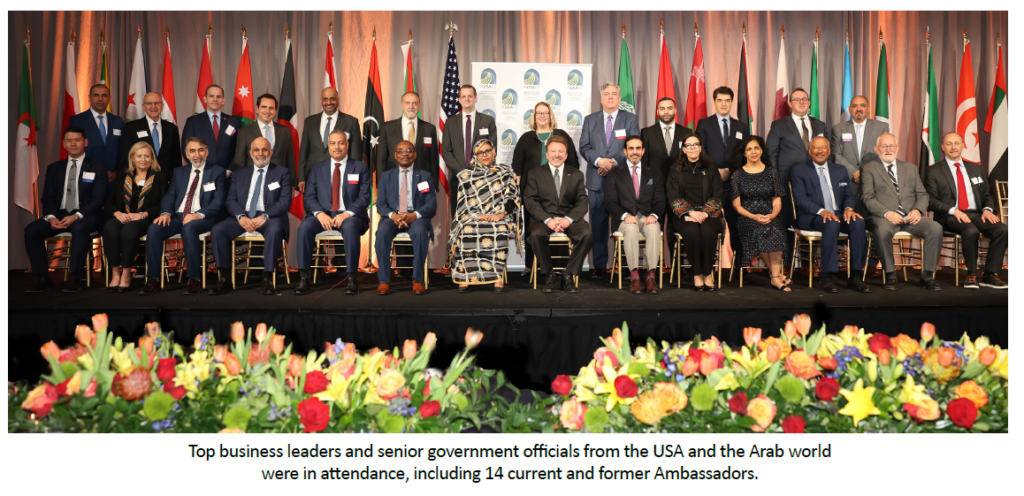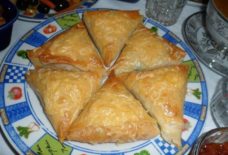NUSACC's Fourteenth Annual Iftar Dinner Encourages Tolerance and Compassion in a Time of Disruption

Leaders from All Walks of Life – Including Chiefs of Mission – Recognize Ramadan as a Time of Celebration, But Also Remembrance and Reflection
Imam Arafat: “Ramadan teaches Muslims to recognize the shared humanity of all people, transcending cultural, racial, and religious differences. We are reminded that love and compassion are universal values that bind people together.”
In recent days, the National U.S. – Arab Chamber of Commerce (NUSACC) – America’s #1 business gateway to the Middle East and North Africa (MENA) – hosted its fourteenth annual Iftar dinner in honor of the Arab diplomatic missions in the United States. Held in partnership with the League of Arab States and the Ritz-Carlton Hotel in Washington DC, this high-level event drew top business executives and senior government officials, including 14 current and former Ambassadors. (A short video highlighting the Iftar may be found here.)
The NUSACC Iftar has become a Washington tradition. The Embassy of the United Arab Emirates served as Lead Sponsor of this year’s event, supported by ten Gold sponsors. These included: Leading tech companies (Assured Communications Advisors, Dexian, and Encore); blue-chip companies (Boeing, Ford Motor Company, General Atomics Aeronautical Systems, and Leo A. Daly); companies that certify quality Halal products (Halal Transactions of Omaha, Islamic Services of America, and IFANCA – the Islamic Food and Nutrition Council of America).
“Breaking Bread” at the NUSACC Iftar
“Ramadan encourages compassion, tolerance, empathy, forgiveness, and respect,” noted David Hamod, NUSACC’s President & CEO. The NUSACC Iftar dinner provides an opportunity for people of all faiths to “break bread” and draw upon the best that humanity has to offer.
H.E. Ambassador Abdulkhalig Bin Rafaa, Chief Representative of the Arab League in Washington DC, expressed appreciation for the opportunity to raise cultural awareness. “The Arab League cherishes its partnership with NUSACC,” said Bin Rafaa. “Both entities serve as bridges between the Arab world and the United States, and we are grateful for these opportunities to promote cultural understanding.”
This year’s event took place against a backdrop of renewed suffering in Gaza and elsewhere in the Middle East and North Africa. “Ramadan is a time of celebration,” noted David Hamod, “but it is also a time of remembrance and reflection.” He went on to say, “This has been a very challenging year in the Middle East and North Africa, with more than 50,000 people losing their lives to wars, failed migration, disease, starvation, and natural disasters.”
Hamod concluded his welcome remarks with a moment of silence dedicated to innocent victims across the MENA region. The war in Gaza, he said, “has gone on far too long. For the sake of all peoples in the region, it is time for this war to stop!”
Ramadan in Context
Breaking the fast (Iftar) during Ramadan is a traditional event performed daily by the estimated two billion Muslims around the globe. Ramadan is a holy month of spiritual cleansing in which adherents of Islam rededicate themselves to God, worship, and reading the Qur’an, Islam’s holiest book. The month-long period is marked by fasting, personal sacrifice, self-discipline, and increased generosity, especially toward the underprivileged.
NUSACC’s Iftar provides an opportunity to gain a better understanding of Arab and Islamic customs and traditions. The event also highlights Arab embassies and consulates in the United States, which are dedicated to promoting political and commercial relations with the USA.
The League of Arab States and the Union of Arab Chambers officially recognize NUSACC as a key business gateway between the United States and the 22 countries of the Arab world. In this spirit, in 2024, NUSACC received the E Star Award from the President of the United States, the most prestigious prize for export excellence in the USA.
The NUSACC Iftar, now in its fourteenth year, was the first of its kind, and it continues to set the standard for Iftar dinners in the United States. It is widely regarded as the most elegant Iftar in America, in part because of the event’s partnership with The Ritz-Carlton, the Luxury Brand Leader of Marriott International. At the end of the evening, guests’ names were drawn from a hat to provide complimentary stays at four regional Ritz-Carlton properties: Georgetown, Pentagon City, Tysons Corner, and Washington DC.
Imam Bashar Arafat on Love in the Time of Ramadan
Imam Mohamad Bashar Arafat, President of the Islamic Affairs Council of Maryland, offered remarks after dinner. (A video of the Imam’s speech may be found here.)
“Ramadan is a month that offers countless opportunities for personal growth and transformation,” he noted. “It combines spirituality, self-reflection, social unity, family reconciliation, and generosity, making it a time of deep significance and beauty.”
“As Muslims around the world come together to fast, pray, give, and reflect,” Imam Arafat suggested, “they create an atmosphere of love, peace, and compassion that echoes throughout the entire year.” As such, he said, “Ramadan is a reminder of the importance of gratitude, self-discipline, and the power of unity in building a more peaceful, just, and harmonious society, country, and world.”
The Holy Qur’an offers guidance during the Holy Month of Ramadan and throughout the year. “For every Muslim, the Qur’an is much more than just a book,” noted the Imam. “It is a guide to life, a source of spiritual connection, an ethical blueprint, a tool for personal transformation, and the very word of God that shapes their identity, beliefs, and actions.”
He went on to say, “Muslims turn to the Qur’an in times of joy and hardship, seeking its wisdom, comfort, and guidance. Through its recitation and reflection, Muslims aim to strengthen their relationship with Allah and live lives that align with His divine will.” Like NUSACC’s David Hamod, Imam Arafat highlighted how Ramadan focuses attention on the need for peace and justice in Gaza and beyond.
The Imam talked about the importance of love during the Holy Month. “Ramadan is about revisiting our love for God, ourselves, and the people around us,” he noted. Love of God enhances spiritual growth, he said, while also highlighting families and communities.
Another expression of this love, he suggested, is charity. “Muslims are encouraged to give generously during this month, particularly through Zakat (obligatory charity) and Sadaqah (voluntary charity),” the Imam noted. “These acts of giving are about fostering love, empathy, and solidarity with those who are less fortunate. The act of sharing what one has – whether through food, money, or time – reflects a deep love for humanity and the desire to alleviate suffering.”
“Ramadan teaches Muslims to recognize the shared humanity of all people, transcending cultural, racial, and religious differences,” he said. “During Ramadan, we are reminded that love and compassion are universal values that bind people together across different walks of life. It is a time to break down barriers, promote understanding, and reach out to others in peace and solidarity.”
Imam Arafat concluded, “Ultimately, Ramadan is about transforming love into action. It is a love that inspires individuals to carry the lessons of Ramadan – patience, compassion, humility, generosity, and unity – throughout the entire year. Ramadan is a reminder that love should guide our actions in every aspect of life.”
Ibn Battuta: Spreading Cultural Understanding Across the World
During the Iftar celebration, NUSACC’s David Hamod typically shares stories that provide insights about the Arab world. These stories serve to highlight the shared experience of Americans and Arabs.
This year, Hamod talked about the greatest explorer in pre-modern history, Ibn Battuta. He began his travels in Tangier, Morocco, on June 14, 1325. In other words, June 14 of this year will mark 700 years to the day since the Arab world’s most prodigious voyager began his travels. (A video of Hamod’s remarks may be found here.)
Over three decades, Ibn Batutta traveled about 75,000 miles. That’s five times more than Marco Polo. In fact, Ibn Battuta traveled the same distance as Marco Polo, Christopher Columbus, and Vasco da Gama combined!
But unlike most other explorers at that time, Ibn Battuta traveled primarily overland, not by ship, which enabled him to directly experience the world’s peoples and cultures.
“One can only imagine the dangers that Ibn Battuta encountered,” said Hamod. “He faced some of the world’s most inhospitable terrain, a dearth of potable water, and unfriendly (and often poisonous) wildlife. Not to mention brigands, pirates, and all manner of thieves and highwaymen.”
In those days, there were few cures for diseases. For example, Ibn Battuta’s travels overlapped with the Black Death, which decimated cities and communities. One-third of the population of the Middle East perished at the hands of the Black Death, exceeded by Europe, which lost an estimated 50 percent of its population.
Despite these challenges, Hamod said, Ibn Battuta had at least three things going for him. First, he could take advantage of the rules of hospitality, which were well defined in Dar Al-Islam, the Islamic world. Second, he came from a family of Islamic legal scholars (Qadis), which gave him credibility and authority.
Perhaps most important, Hamod said: In the 14th Century, because of the spread of Islam, the Arabic language was a lingua franca understood throughout much of the known world. As such, Ibn Battuta could be understood in Arabic wherever he traveled, including China, which he reached in 1345.
Ibn Battuta visited the equivalent of 40 present-day countries. That’s a remarkable achievement unto itself, Hamod noted. “But let us not overlook the important role that Ibn Battuta played in spreading Arab and Islamic culture through the stories that he told and the insights that he shared. Simply put, he played a singular role across continents in promoting governance, jurisprudence, science, culture, navigation, and a thoughtful interpretation of Islam.”
Coming home to Tangier, after his final voyage, Ibn Battuta himself put it best. He said: “Traveling leaves you speechless, then it turns you into a storyteller.”
To read the full report, please click here.
Visit our blog here!








